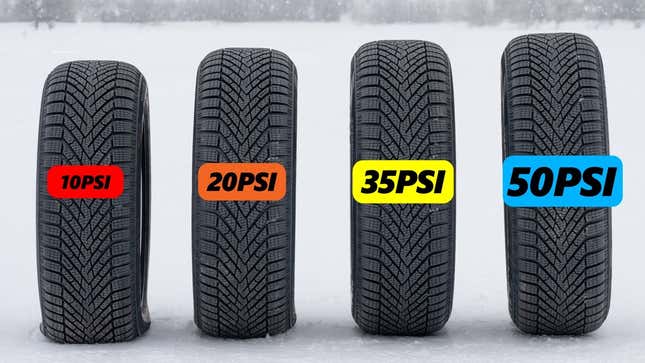
When it comes to driving in the snow, it can help to adjust the air pressure in your tires, at least theoretically. Annoyingly, depending on who you ask, there’s a good chance you’ll get conflicting answers to whether it’s better to add more air or let a little air out. Those who argue the former say increasing the tire pressure reduces the size of the contact patch, which should increase the pressure and therefore the grip. Proponents of the latter say that letting air out of the tire increases the size of the contact patch, putting more of the tire in contact with the ground and offering more grip.
Surely, two opposite approaches can’t be equally effective, right? So which one actually benefits snow performance the best? Conveniently, our friends over at Tyre Reviews decided to answer that exact question. They took a Pirelli winter tire and ran it through a series of tests, evaluating its snow traction, snow braking, snow handling, ice traction and ice braking starting at 50 psi and working their way down 10 psi at a time until they got to 10 psi.
When testing acceleration in the snow, lower tire pressure was clearly better. Accelerating from five to 35 km/h in the 50 psi tire took 5.65 seconds, while the tire with 10 psi did it in 4.69 seconds, and each step down improved acceleration. Braking tests showed a similar trend, and handling was the same story, although 10 psi was definitely too low for optimal road handling. On ice, lower was also better until you got to 10 psi, where acceleration suddenly got way worse.
Braking on ice, on the other hand, was a little weird. Despite a general trend of lower tire pressure leading to lower braking distances, the 30 psi tires performed the worst. Why that’s the case and why acceleration got worse at 10 psi but braking got better, it still isn’t clear. But that’s also what happens when you run experiments. So in the end, lower tire pressure wins out over going higher, but you can also definitely go too low. Don’t drop it all the way down to 10 psi.
Now you know — if you need a little extra grip in the snow, just let some air out of your tires.